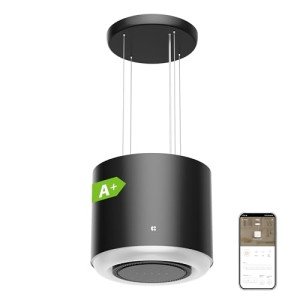
The Essential Guide to Extractor Fans for Island Hobs
In modern kitchens, the island hob has actually emerged as a standout feature, serving as a focal point for culinary imagination and celebrations. However, with the introduction of open-plan home, the need for efficient ventilation ends up being important. An extractor fan for an island hob is not simply a luxury; it's a requirement. This article will dive into the reasons you ought to consider setting up an extractor fan, the types readily available, their functions, and the very best practices for installation and maintenance.
Why Install an Extractor Fan for Island Hobs?
Island hobs are often located far from walls, making standard overhead extraction hoods unwise. Here are some essential factors why an extractor fan is vital for island hobs:
Air Quality Improvement: Cooking produces smoke, steam, and odors. An extractor fan successfully removes these pollutants, resulting in a cleaner kitchen island extractor hood environment.
Heat Reduction: Extractor fans help expel hot air, contributing to a more comfortable cooking environment.
Defense Against Grease Build-Up: Continuous direct exposure to cooking fumes can cause grease accumulation on surfaces. An extractor fan alleviates this danger.
Aesthetic Appeal: Many modern-day extractor Fan for island fans are designed to match kitchen visual appeals, ending up being elegant additions rather than eyesores.
Kinds Of Extractor Fans
When picking an extractor fan for an island hob, it's crucial to think about the different types offered on the market. Here are the most typical:
| Type | Description | Pros | Cons |
|---|---|---|---|
| Ducted | These systems vent air outside by means of a duct. | Extremely efficient at removing odors and smoke; enhances air quality. | Setup can be complicated; needs a course to exterior. |
| Ductless (Recirculating) | Filters air and recirculates it back into the kitchen extractor hood island. | Simpler to install; no external vent required. | Less efficient in eliminating smoke and smells; needs frequent filter changes. |
| Downdraft | Retractable system positioned behind the hob. | Discreet design; effective for island extractor hood settings. | Reasonably expensive; might not be as effective as standard hoods. |
| Wall-mounted | Comparable to standard hoods however developed to hang over islands. | Efficient and readily available in different styles. | Needs sufficient area; can block views. |
Secret Features to Consider
When buying an extractor fan for an island cooker hoods 60cm hob, there are a number of functions to remember to ensure optimal efficiency and satisfaction:
Suction Power: Measured in cubic meters per hour (m ³/ h), this shows how effectively the fan can get rid of air. A higher ranking is normally chosen for effective ventilation, especially in large, open areas.
Noise Level: Measured in decibels (dBA), quieter models are preferable for comfort, particularly in open-plan designs.
Filter Quality: Ensure the fan is equipped with top quality filters (e.g., triggered carbon filters for ductless designs) that can be quickly changed.
Control Options: Look for fans with intuitive controls such as touchscreens, push-button controls, or clever features that allow for seamless operation.
Energy Efficiency: Opt for energy-rated models to decrease energy consumption and long-term expenses.

Installation Best Practices
Setting up an extractor fan requires careful planning to optimize its efficiency. Here are some essential suggestions:
Positioning: Mount the fan 65-75 cm above the cooking surface area for ideal efficiency.
Sufficient Ducting: If choosing a ducted fan, make sure that ducting is kept straight and Extractor Fan For Island as brief as possible to lessen air flow resistance.
Electrical Work: Hire a licensed electrical expert to ensure that all electrical connections comply with safety standards.
Follow Manufacturer Guidelines: Adhere strictly to the setup directions supplied by the manufacturer to make sure security and performance.
Expert Installation: Where required, consult professional installers for complex systems, specifically those needing duct work.
Upkeep Tips
To make sure long-lasting efficiency from your extractor fan, extractor fan for island regular upkeep is necessary. Consider the following pointers:
Clean Filters: Depending on usage, clean or replace filters regular monthly for optimal air quality.
Inspect Ducts: Regularly inspect ductwork for any obstructions or damage and tidy as required.
Ward off Grease Buildup: Periodically wipe down surfaces to prevent grease accumulation.
Utilize a Soft Cloth: For regular cleaning, utilize a damp fabric and moderate cleaning agent, avoiding abrasive materials.
Frequently asked questions
1. How do I choose the ideal size extractor fan?
Identify the required airflow using the space size. Determine it based upon the kitchen's volume (length × width × height) and multiply by 10 to 15 air modifications per hour.
2. Are ductless extractor fans effective?
While ductless fans are much easier to install, they are less efficient compared to ducted systems. They can purify the air but might enable some odors to linger.
3. Can I set up an extractor fan myself?
It is recommended to seek expert aid for setup, especially for ducted fans, as inappropriate installation can result in reduced performance and safety dangers.
4. How frequently should I change extractor fan filters?
For ideal performance, replace or tidy filters every 1-3 months, depending upon cooking frequency and the type of filter.
5. Do extractor fans take in a lot of electrical power?
Modern extractor fans are created to be energy-efficient. Check the energy rating before purchase to select a more economical alternative.
An extractor fan for an black island extractor fan hob not only improves cooking experiences but also safeguards indoor air quality, adding to a more pleasurable kitchen environment. By thinking about the types offered, vital functions, and appropriate setup and upkeep, property owners can make educated decisions that match their requirements. With the best extractor fan, cooking can be a pleasant and healthy leisure activity, free from concerns about air quality and comfort.
📌 The 9 Things Your Parents Teach You About Extractor Fan For Island Hob
